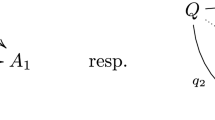Abstract
Composition of the many-valued powerset partially ordered monad with the term monad provides extensions to non-classical relations and also new examples for Kleene algebras.
Preview
Unable to display preview. Download preview PDF.
Similar content being viewed by others
References
Aho, A.V., Hopcroft, J.E., Ullman, J.D.: The Design and Analysis of Computer Algorithms. Addison-Wesley, Reading (1975)
Adámek, J., Herrlich, H., Strecker, G.: Abstract and concrete categories. Wiley-Interscience, New York (1990)
Barr, M., Wells, C.: Toposes, Triples and Theories. Springer, Heidelberg (1985)
Beck, J.: Distributive laws, Seminars on Triples and Categorical Homology Theory, 1966/1967. Lecture Notes in Mathematics, vol. 80, pp. 119–140. Springer, Heidelberg (1969)
Eklund, P., Galán, M.A., Gähler, W.: Partially ordered monads for monadic topologies, Kleene algebras and rough sets. Electronic Notes in Theoretical Computer Science 225(5), 67–81 (2009)
Eklund, P., Gähler, W.: Generalized Cauchy spaces. Math. Nachr. 147, 219–233 (1990)
Eklund, P., Gähler, W.: Fuzzy Filter Functors and Convergence. In: Rodabaugh, S.E., Klement, E.P., Höhle, U. (eds.) Applications of category theory to fuzzy subsets. Theory and Decision Library B, pp. 109–136. Kluwer, Dordrecht (1992)
Eklund, P., Gähler, W.: Completions and Compactifications by Means of Monads. In: Lowen, R., Roubens, M. (eds.) Fuzzy Logic, State of the Art, pp. 39–56. Kluwer, Dordrecht (1993)
Eklund, P., Gähler, W.: Partially ordered monads and powerset Kleene algebras. In: Proc. 10th Information Processing and Management of Uncertainty in Knowledge Based Systems Conference, IPMU 2004 (2004)
Eklund, P., Galán, M.A., Ojeda-Aciego, M., Valverde, A.: Set functors and generalised terms. In: Proc. 8th Information Processing and Management of Uncertainty in Knowledge-Based Systems Conference (IPMU 2000), pp. 1595–1599 (2000)
Eklund, P., Galán, M.A., Medina, J., Ojeda Aciego, M., Valverde, A.: A categorical approach to unification of generalised terms. Electronic Notes in Theoretical Computer Science 66(5) (2002), http://www.elsevier.nl/locate/entcs/volume66.html
Gähler, W.: A topological approach to structure theory. Math. Nachr. 100, 93–144 (1981)
Gähler, W.: Monads and convergence. In: Proc. Conference Generalized Functions, Convergences Structures, and Their Applications, Dubrovnik (Yugoslavia) 1987, pp. 29–46. Plenum Press, New York (1988)
Gähler, W.: General Topology – The monadic case, examples, applications. Acta Math. Hungar. 88, 279–290 (2000)
Gähler, W.: Extension structures and completions in topology and algebra. In: Seminarberichte aus dem Fachbereich Mathematik, Band 70, FernUniversität in Hagen (2001)
Gähler, W., Eklund, P.: Extension structures and compactifications. In: Categorical Methods in Algebra and Topology (CatMAT 2000), pp. 181–205 (2000)
Godement, R.: Topologie algébrique et théorie des faisceaux, appendix. Hermann, Paris (1958)
Goguen, J.A.: L-fuzzy sets. J. Math. Anal. Appl. 18, 145–174 (1967)
Helgesson, R.: A categorical approach to logics and logic homomorphisms, UMNAD 676/07, Umeå University, Department of Computing Science (2007)
Huber, P.J.: Homotopy theory in general categories. Math. Ann. 144, 361–385 (1961)
Keller, H.H.: Die Limesuniformisierbarkeit der Limesräume. Math. Ann. 176, 334–341 (1968)
Kleene, S.C.: Representation of events in nerve nets and finite automata. In: Shannon, C.E., McCarthy, J. (eds.) Automata Studies, pp. 3–41. Princeton University Press, Princeton (1956)
Kowalsky, H.-J.: Limesräume und Komplettierung. Math. Nachr. 12, 301–340 (1954)
Kozen, D.: On induction vs. ∗ -continuity. In: Kozen, D. (ed.) Logic of Programs 1981. LNCS, vol. 131, pp. 167–176. Springer, Heidelberg (1982)
Kozen, D.: Kleene algebra with tests. ACM Transactions on Programming Languages and Systems 19, 427–443 (1999)
Kuich, W., Salomaa, A.: Semirings, Automata, and Languages. Springer, Berlin (1986)
Lawvere, F.W.: Functorial Semantics of Algebraic Theories, Dissertation. Columbia University (1963)
Loeckx, J., Ehrich, H.-D., Wolf, M.: Specification of Abstract Data Types. Wiley-Teubner, Chichester (1996)
Manes, E.G.: Algebraic Theories. Springer, Heidelberg (1976)
Meseguer, J.: General logics. In: Ebbinghaus, H.-D., et al. (eds.) Logic Colloquium 1987, pp. 275–329. Elsevier, North-Holland, Amsterdam (1989)
Moggi, E.: An Abstract View of Programming Languages, Edinburgh Univ., Dept. of Comp. Sci. (1989)
Moggi, E.: Notions of computation and monads. Information and Computation 93, 55–92 (1991)
Pratt, V.: Action Logic and Pure Induction. In: van Eijck, J. (ed.) JELIA 1990. LNCS, vol. 478, pp. 97–120. Springer, Heidelberg (1991)
Richardson, G.D.: A Stone-Čech compactification for limit spaces. Proc. Amer. Math. Soc. 25, 403–404 (1970)
Rydeheard, D.E., Burstall, R.M.: A categorical unification algorithm. In: Poigné, A., Pitt, D.H., Rydeheard, D.E., Abramsky, S. (eds.) Category Theory and Computer Programming. LNCS, vol. 240, pp. 493–505. Springer, Heidelberg (1986)
Salomaa, A.: Two complete axiom systems for the algebra of regular events. J. ACM 13, 158–169 (1966)
Tarski, A.: On the calculus of relations. J. Symbolic Logic 6, 65–106 (1941)
Wadler, P.: Comprehending monads. Mathematical Structures in Computer Science 2, 461–493 (1992)
Author information
Authors and Affiliations
Editor information
Editors and Affiliations
Rights and permissions
Copyright information
© 2009 Springer-Verlag Berlin Heidelberg
About this paper
Cite this paper
Eklund, P., Helgesson, R. (2009). Composing Partially Ordered Monads. In: Berghammer, R., Jaoua, A.M., Möller, B. (eds) Relations and Kleene Algebra in Computer Science. RelMiCS 2009. Lecture Notes in Computer Science, vol 5827. Springer, Berlin, Heidelberg. https://doi.org/10.1007/978-3-642-04639-1_7
Download citation
DOI: https://doi.org/10.1007/978-3-642-04639-1_7
Publisher Name: Springer, Berlin, Heidelberg
Print ISBN: 978-3-642-04638-4
Online ISBN: 978-3-642-04639-1
eBook Packages: Computer ScienceComputer Science (R0)




